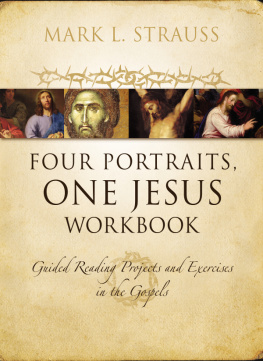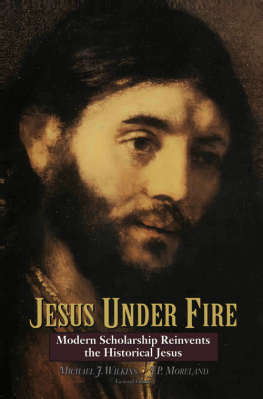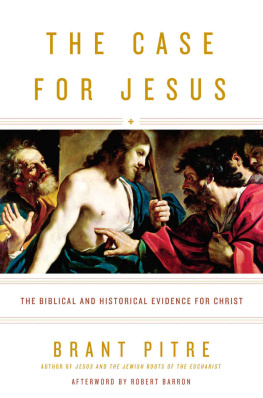THE LIFE OF JESUS
BY
ERNEST RENAN
This edited version, including layout, typography, additions to text, cover artwork and other unique factors is copyright 2012 Andrews UK Limited
This book is sold subject to the condition that it shall not, by way of trade or otherwise, be lent, resold, hired out or otherwise circulated without the publishers prior written consent in any form of binding or cover other than that in which it is published, and without a similar condition being imposed on the subsequent purchaser.
TO THE PURE SOUL OF
MY SISTER HENRIETTE
Who Died at Byblus on the 24th of September, 1861
Dost thou recall, from the bosom of God where thou reposest, those long days at Ghazir, in which, alone with thee, I wrote these pages, inspired by the places we had visited together? Silent at my side, thou didst read and copy each sheet as soon as I had written it, whilst the sea, the villages, the ravines, and the mountains, were spread at our feet. When the overwhelming light had given place to the innumerable army of stars, thy shrewd and subtle questions, thy discreet doubts, led me back to the sublime object of our common thoughts. One day thou didst tell me that thou wouldst love this book - first, because it had been composed with thee, and also because it pleased thee. Though at times thou didst fear for it the narrow judgments of the frivolous, yet wert thou ever persuaded that all truly religious souls would ultimately take pleasure in it. In the midst of these sweet meditations, the Angel of Death struck us both with his wing: the sleep of fever seized us at the same time - I awoke alone!... Thou sleepest now in the land of Adonis, near the holy Byblus and the sacred stream where the women of the ancient mysteries came to mingle their tears. Reveal to me, O good genius, to me whom thou lovedst, those truths which conquer death, deprive it of terror, and make it almost beloved.
PREFACE
In presenting an English version of the celebrated work of M. Renan, the translator is aware of the difficulty of adequately rendering a work so admirable for its style and beauty of composition. It is not an easy task to reproduce the terseness and eloquence which characterize the original. Whatever its success in these respects may be, no pains have been spared to give the author's meaning. The translation has been revised by highly competent persons; but although great care has been taken in this respect, it is possible that a few errors may still have escaped notice.
The great problem of the present age is to preserve the religious spirit, whilst getting rid of the superstitions and absurdities that deform it, and which are alike opposed to science and common sense. The works of Mr. F.W. Newman and of Bishop Colenso, and the "Essays and Reviews," are rendering great service in this direction. The work of M. Renan will contribute to this object; and, if its utility may be measured by the storm which it has created amongst the obscurantists in France, and the heartiness with which they have condemned it, its merits in this respect must be very great. It needs only to be added, that whilst warmly sympathizing with the earnest spirit which pervades the book, the translator by no means wishes to be identified with all the opinions therein expressed.
December 8, 1863.
AUTHOR'S INTRODUCTION,
In Which the Sources of This History Are Principally Treated
A history of the "Origin of Christianity" ought to embrace all the obscure, and, if one might so speak, subterranean periods which extend from the first beginnings of this religion up to the moment when its existence became a public fact, notorious and evident to the eyes of all. Such a history would consist of four books. The first, which I now present to the public, treats of the particular fact which has served as the starting-point of the new religion, and is entirely filled by the sublime person of the Founder. The second would treat of the apostles and their immediate disciples, or rather, of the revolutions which religious thought underwent in the first two generations of Christianity. I would close this about the year 100, at the time when the last friends of Jesus were dead, and when all the books of the New Testament were fixed almost in the forms in which we now read them. The third would exhibit the state of Christianity under the Antonines. We should see it develop itself slowly, and sustain an almost permanent war against the empire, which had just reached the highest degree of administrative perfection, and, governed by philosophers, combated in the new-born sect a secret and theocratic society which obstinately denied and incessantly undermined it. This book would cover the entire period of the second century. Lastly, the fourth book would show the decisive progress which Christianity made from the time of the Syrian emperors. We should see the learned system of the Antonines crumble, the decadence of the ancient civilization become irrevocable, Christianity profit from its ruin, Syria conquer the whole West, and Jesus, in company with the gods and the deified sages of Asia, take possession of a society for which philosophy and a purely civil government no longer sufficed. It was then that the religious ideas of the races grouped around the Mediterranean became profoundly modified; that the Eastern religions everywhere took precedence; that the Christian Church, having become very numerous, totally forgot its dreams of a millennium, broke its last ties with Judaism, and entered completely into the Greek and Roman world. The contests and the literary labors of the third century, which were carried on without concealment, would be described only in their general features. I would relate still more briefly the persecutions at the commencement of the fourth century, the last effort of the empire to return to its former principles, which denied to religious association any place in the State. Lastly, I would only foreshadow the change of policy which, under Constantine, reversed the position, and made of the most free and spontaneous religious movement an official worship, subject to the State, and persecutor in its turn.
I know not whether I shall have sufficient life and strength to complete a plan so vast. I shall be satisfied if, after having written the Life of Jesus, I am permitted to relate, as I understand it, the history of the apostles, the state of the Christian conscience during the weeks which followed the death of Jesus, the formation of the cycle of legends concerning the resurrection, the first acts of the Church of Jerusalem, the life of Saint Paul, the crisis of the time of Nero, the appearance of the Apocalypse, the fall of Jerusalem, the foundation of the Hebrew-Christian sects of Batanea, the compilation of the Gospels, and the rise of the great schools of Asia Minor originated by John. Everything pales by the side of that marvellous first century. By a peculiarity rare in history, we see much better what passed in the Christian world from the year 50 to the year 75, than from the year 100 to the year 150.
The plan followed in this history has prevented the introduction into the text of long critical dissertations upon controverted points. A continuous system of notes enables the reader to verify from the authorities all the statements of the text. These notes are strictly limited to quotations from the primary sources; that is to say, the original passages upon which each assertion or conjecture rests. I know that for persons little accustomed to studies of this kind many other explanations would have been necessary. But it is not my practice to do over again what has been already done well. To cite only books written in French, those who will consult the following excellent writings[1] will there find explained a number of points upon which I have been obliged to be very brief:
Next page










